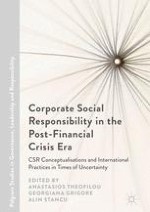2017 | Book
Corporate Social Responsibility in the Post-Financial Crisis Era
CSR Conceptualisations and International Practices in Times of Uncertainty
Editors: Anastasios Theofilou, Georgiana Grigore, Alin Stancu
Publisher: Springer International Publishing
Book Series : Palgrave Studies in Governance, Leadership and Responsibility
